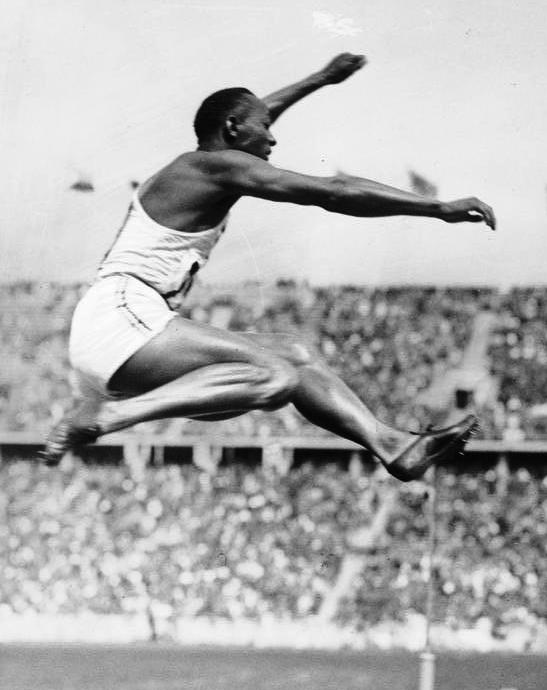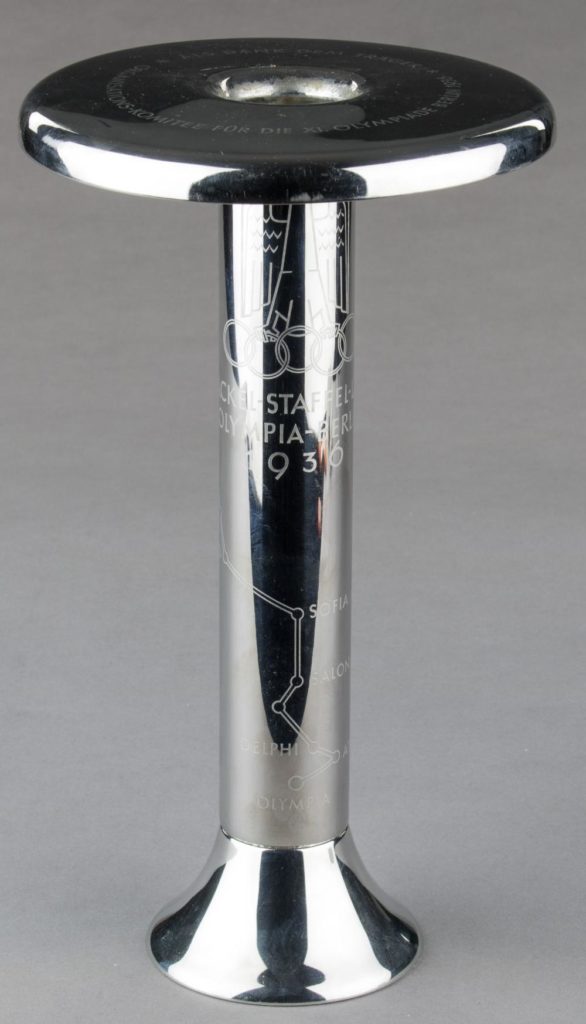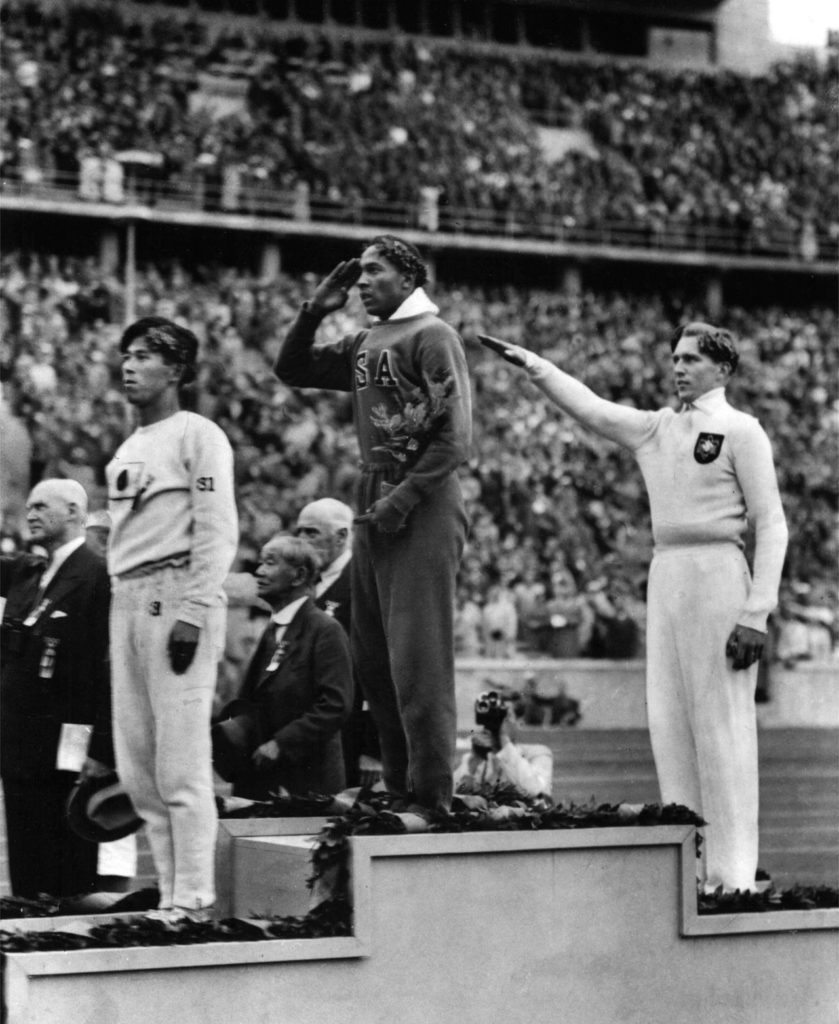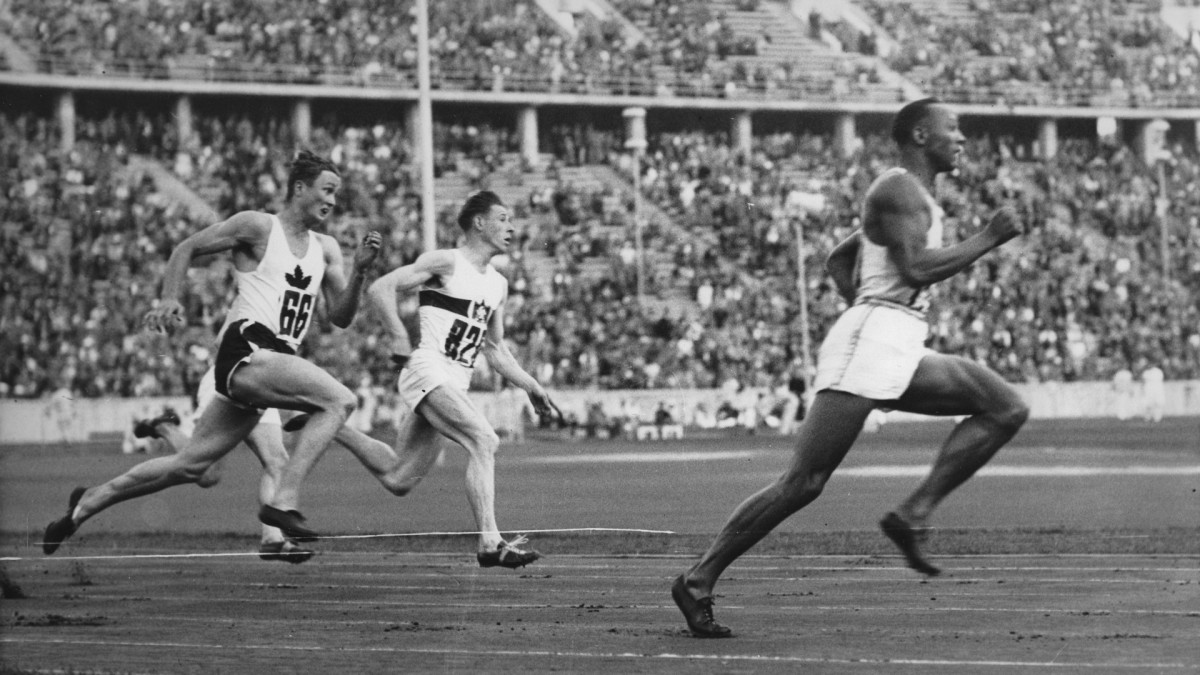
The American Journey Vault is home to a number of items from the exceptional life of Olympian Jesse Owens.
Born in 1913 to Alabama sharecroppers, Jesse Cleveland Owens was the youngest of ten children. When he was nine, the Owens family moved to Cleveland, Ohio, where the Jesse would meet several important figures in his life including track coach Charles Riley and his future wife, Minnie Ruth Solomon. By the time Owens entered high school he had already become a star athlete, and at the 1933 National High School Championship he tied the world record time in the 100-yard dash of 9.4 seconds.
His true rise to stardom, however, occurred in 1935 at the Ben Ten meet in Ann Arbor, Michigan. That day Owens set world records in long jump, 220 Yard Sprint, and the 220 Yard Low Hurdles. He also tied the world record once again in the 100 Yard Dash. This display of unparalleled athletic achievement cemented Owens’ position in the American track and field community. With the 1936 Olympics in Berlin right around the corner, Owens carried with him the expectations of an entire country.
Later in life, Owens recalled the thoughts he had while travelling across the ocean to Europe pondering what he had the opportunity to accomplish:
In the early 1830s, my ancestors were brought on a boat across the Atlantic Ocean from Africa to America as slaves for men who felt they had the right to own other men. In August of 1936, I boarded a boat to go back across the Atlantic Ocean to do battle with Adolf Hitler, a man who though all other men should be slaves to him and his Aryan armies.[1]

Recognizing the same ideology at play in Germany, Owens viewed the Olympics as an opportunity to show the world the bankrupt nature of Nazism.
In the American Journey Vault stands one of the Olympic torches used during the relay from Olympia, Greece, to Berlin. The torch shows the map of the route which over 3,000 torchbearers combined to get the flame from the Temple of Hera to Berlin, some 1,911 miles, in just over 10 days.[2] In just a few short years the entire route would be under Nazi subjugation.
With the Olympic flame being lit on August 1, 1936, Owens got to work quickly in proving that the Aryan race did not measure up to Hitler’s promises. On August 3rd, Owens won the gold medal in the 100 Meter Dash with a time of 10.3 seconds. When he stood on the medalist platform to his gold medal, Jesse Owens said, “My eyes blurred as I heard the Star-Spangled Banner played, first faintly and then loudly, and the saw the American flag slowly raised for my victory.”[3]
The next day, August 4th, Owens took gold in the Long Jump over German competitor Luz Long. Long had actually helped Owens during the trials and the two men became close friends. Their tense, back-and-forth long jump duel was filmed and presented in the documentary Olympia (1938) which can be viewed below. Long and Owens maintained a regular correspondence after the Olympics until Long’s death during the Second World War. After the war ended, Owens traveled to Germany to find Long’s son and tell him about his father.
Then, on August 5th, Jesse Owens once again claimed the gold medal, but this time in the 200 Meter Sprint. After being substituted in at the last moment, Owens helped propel the American team to ultimate victory in the 4×100 Meter Relay. During the games, a German autograph hunter sought out the signatures of many of the athletes who had won gold medals. On the top of the second page is the signature of Jesse Owens with a list of the events he had won up to that point and is preserved in the American Journey Vault.


Jesse Owens’ massive success frustrated Hitler who, according to Minister of Armament and War Production Albert Speer, tried rationalizing it away on racist ground. Speer recalled that Hitler:
Was highly annoyed by the series of triumphs by the marvelous colored American runner, Jesse Owens. People whose antecedents came from the jungle were primitive, Hitler said with a shrug; their physiques were stronger than those of civilized whites. They represented unfair competition and hence must be excluded from future games.[4]
America, however, was thrilled with the remarkable performance of Jesse Owens and greeted him with massive parades. Owens, an active member of the Republican Party, toured the country denouncing President Franklin Roosevelt and advocating for Republican candidates. At an event late in 1936, he explained that despite his evil opinions, Hitler had actually acknowledged him after winning gold in the 100 Meter Dash while the Democratic President Franklin Roosevelt refused to ever invite him to the White House or even congratulate him at all. Owens told the crowd that, “Hitler didn’t snub me—it was our president who snubbed me.…The president didn’t even send me a telegram.”[5]
Throughout his life, Owens displayed a love of America, the flag, and the anthem. When he was leading a youth boxing program in Chicago he was dismayed to find that there was no flag on the pole outside the building. Quickly finding a flag, he personally climbed up the pole and attached it himself. An onlooker reported that, “He could have been killed…but Jesse Owens wanted that American flag flying.”[6] Another time Owens explained that, “All I have and all that I expect to get is under this flag.”[7]
The American Journey Experience is proud to preserve artifacts from the life of Jesse Owens.
[1] Jesse Owens and Paul G. Neimark, Jesse, A Spiritual Autobiography (Plainfield, New Jersey: Logos International, 1978), 51.
[2] “Berlin 1936: The Torch,” Olympics.com (accessed February 18, 2022): https://olympics.com/en/olympic-games/berlin-1936/torch-relay.
[3] Jesse Owens quoted in, William J. Baker, Jesse Owens: An American Life (New York: The Free Press, 1986), 94.
[4] Albert Speer, Inside the Third Reich: Memoirs (New York: Simon & Schuster Paperbacks, 1970), 73. Here.
[5] “‘Snub’ from Roosevelt—’Didn’t Even Send Me a Telegram’ During Olympics, Owens Says,” St. Joseph News-Press (October 16, 1936): 25.
[6] Jesse Owens quoted in, William J. Baker, Jesse Owens: An American Life (New York: The Free Press, 1986), 174.
[7] Jesse Owens quoted in, William J. Baker, Jesse Owens: An American Life (New York: The Free Press, 1986), 206.


